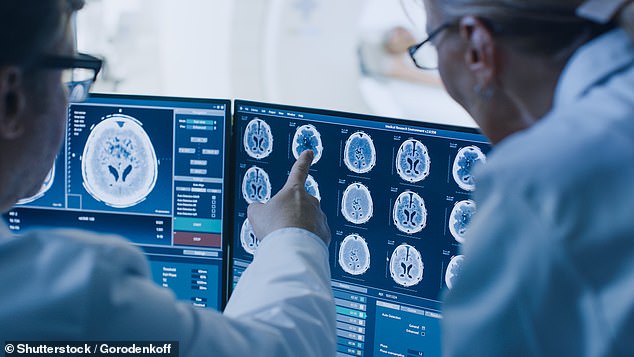[ad_1]
Researchers have identified four distinct pathways to developing dementia—and it could revolutionise how doctors diagnose and treat the devastating disease.
American researchers analysed data from more than 24,000 patients and found four distinct pathways that lead to someone developing the degenerative brain condition.
The pathways are psychiatric conditions, brain dysfunction illnesses, mild cognitive impairments and heart disease.
The scientists found that each pathway had its own characteristics and could be applied to a specific demographic, which might help doctors identify the disease in their patients faster.
Previous studies have concluded that early intervention in dementia cases can increase patients’ treatment options and therefore improve their quality of life.
In the new study, published in medical journal The Lancet, scientists found that in more that than a quarter of cases, health issues paved a predictable pathway to dementia.
For example, patients who had problems with high blood pressure followed by a depressive episode were more likely to develop Alzheimer’s disease.
This is a key discovery, and supports doctors giving patients personalised treatment plans.

A breakthrough study has revealed there are four roads to the debilitating illness dementia
Early intervention for non-brain disease related illnesses—for instance, offering GLP-1 medication to reduce weight which would bring down cholesterol levels and blood pressure—could in theory help prevent a patient from developing dementia.
‘Recognising these sequential patterns rather than focusing on diagnoses in isolation may help clinicians improve Alzheimer’s disease diagnosis,’ said lead author Dr. Timothy Chang, assistant professor in Neurology at UCLA Health.
More than 944,000 people in the UK are thought to be living with dementia, while the figure is thought to be around seven million in the US.
In the UK dementia cases are expected to sky-rocket to 1.4million people by 2040 according to University College London scientists.
Alzheimer’s disease is the leading cause of dementia—a condition that blights the lives of millions of people, robbing loved ones of their memories.
Alzheimer’s Research UK analysis found 74,261 people died from dementia in 2022 compared with 69,178 a year earlier, making it the country’s biggest killer.
Recent analysis by the Alzheimer’s Society estimated the overall annual cost of the dementia to the UK is £42billion a year.
Other research has proposed lifestyle changes to reduce your risk of dementia like preventing hearing loss, socialising and quitting smoking.
Classic early signs of the debilitating illness are memory loss, difficulty concentrating, communication issues and mood problems.
But there are other lesser known signs, with earlier studies connecting changes in sight, hearing, touch and balance with the early stages of the disease.
Experts called for these sensory changes to be included in diagnostic tests to help people be diagnosed sooner.
It comes just days after scientists revealed simple activities can keep your organs like your brain ‘youthful’ reducing your risk of Alzheimer’s disease.
The team found a ‘youthful’ brain ‘provided protection’ from cognitive decline.
They suggested that a routine of vigorous exercise, a diet rich in poultry and oily fish, and keeping your intellect sharp with further education can all help.
Meanwhile, smoking, alcohol, eating processed meat, and living in a deprived area accelerated organ aging.
However, you don’t need to sign up to further education to keep your brain young—a simple crossword in the morning can do the trick.
Other research has found the five-minute activity slows down memory decline in the early stages of dementia.

The number of patients with dementia in the UK is forecast to rise by 42 per cent by 2040
Previously, researchers found moderate-to-vigorous exercise lowers risk of dementia by 41 per cent.
This is exercise which gets the heart racing and breathing to the point you can still speak but not sing, like brisk walking, jogging or cycling.
However, some scientists suggest high intensity workouts (HITT) could be better than cardio for staving off dementia, because they force more blood to the brain.
HITT sees people do short bursts of intense exercise with 80 per cent of their effort, followed by a recovery period to allow their heart rate to drop again.
Often, they involve quick exercises like burpees, mountain climbers, jump squats, kettlebell swings and treadmill sprints.
However, it is best to avoid high-intensity workouts before bedtime, as a study found it reduces sleep, which can increase your risk of dementia.
Other researchers have suggested the ideal age to ramp up exercise to prevent dementia is between the ages of 45 and 65.
But experts have warned that pushing yourself too far during exercise can trigger life-threatening brain-bleeds.
Last month, a super-fit personal trainer claimed medics blamed her sudden brain bleed on ‘years of overdoing it at the gym’.
Linzi Todd, from Northampton, suffered a massive brain bleed in March triggered by fluid leaking from her spine, that doctors put down to her history of intense exercise.
Previous studies have suggested excessive exercise may trigger brain bleeds, leading to potentially fatal strokes or brain haemorrhages.
[ad_2]
This article was originally published by a www.dailymail.co.uk . Read the Original article here. .

